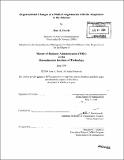Organizational changes at a media conglomerate with the adaption to the Internet
Author(s)
Ferris, Jose A. (Jose Antonio), 1966-
DownloadFull printable version (5.079Mb)
Other Contributors
Sloan School of Management.
Advisor
Pablo J. Boczkowski.
Terms of use
Metadata
Show full item recordAbstract
Since the Internet began to be a source of information to many people around the world, newspapers and other traditional media have had to adapt their strategies in order to cope with this nascent medium. In fact, and years after this process began around 1995. traditional newspapers' web pages are among the most visited sites when readers want to obtain news information. This thesis examines the adaptation to the Internet of an existing media conglomerate from an organizational point of view, and how this adaptation has finally ended in a newsroom convergence that produces several specialized products that are delivered to the customers through different media, such as newspapers, web pages, magazines or radio programs. Since this process began in 1995, the company has developed this adaptation following different strategies that were mostly shaped by several factors, such as technology innovation, the external economic environment, the learning process and the response of the traditional journalists to this new medium, and the response of readers, advertisers, and competitors, among other factors. The investigation of this process was carried out interviewing company's employees at the own firm facilities, and obtaining general information of this kind of process through readings of specialized papers and books.
Description
Thesis (M.B.A.)--Massachusetts Institute of Technology, Sloan School of Management, 2004. Includes bibliographical references (leaf 113).
Date issued
2004Department
Sloan School of ManagementPublisher
Massachusetts Institute of Technology
Keywords
Sloan School of Management.